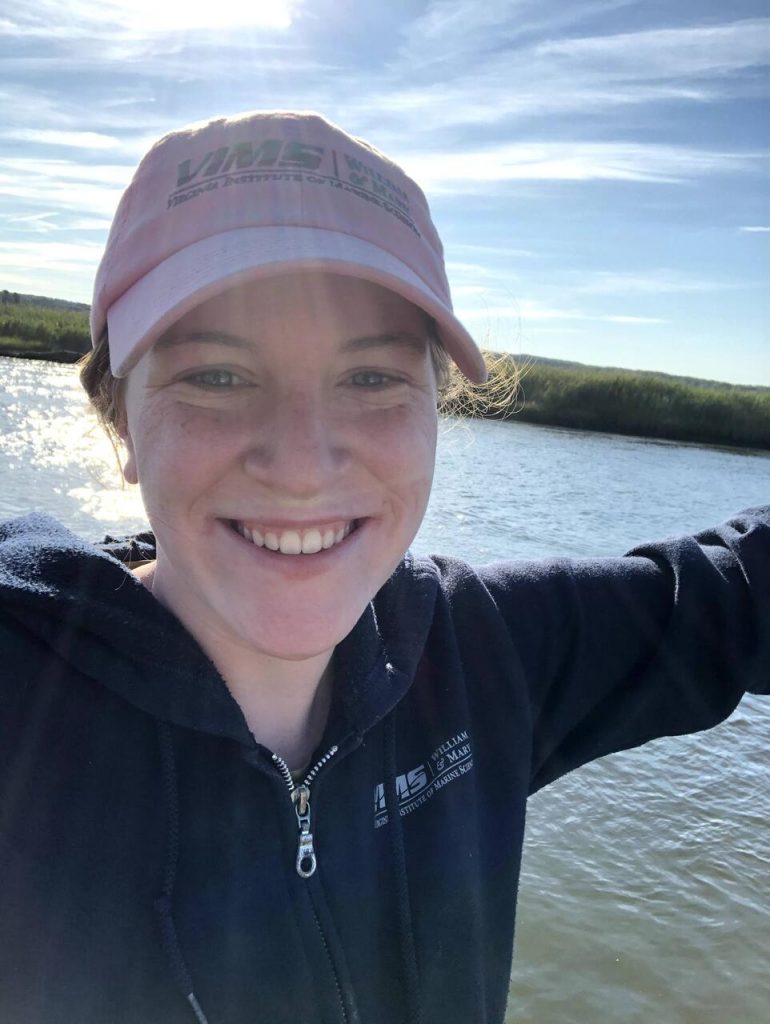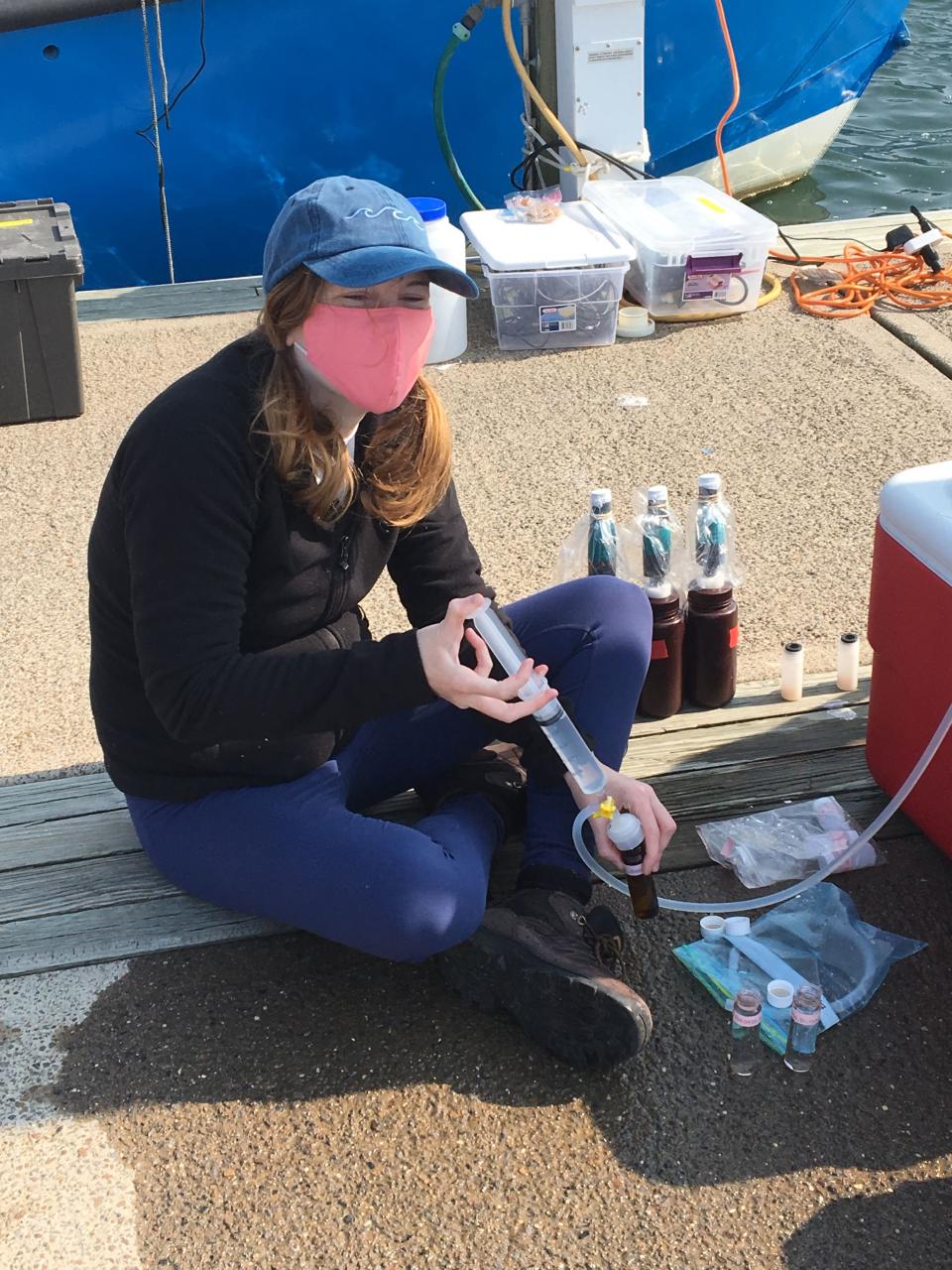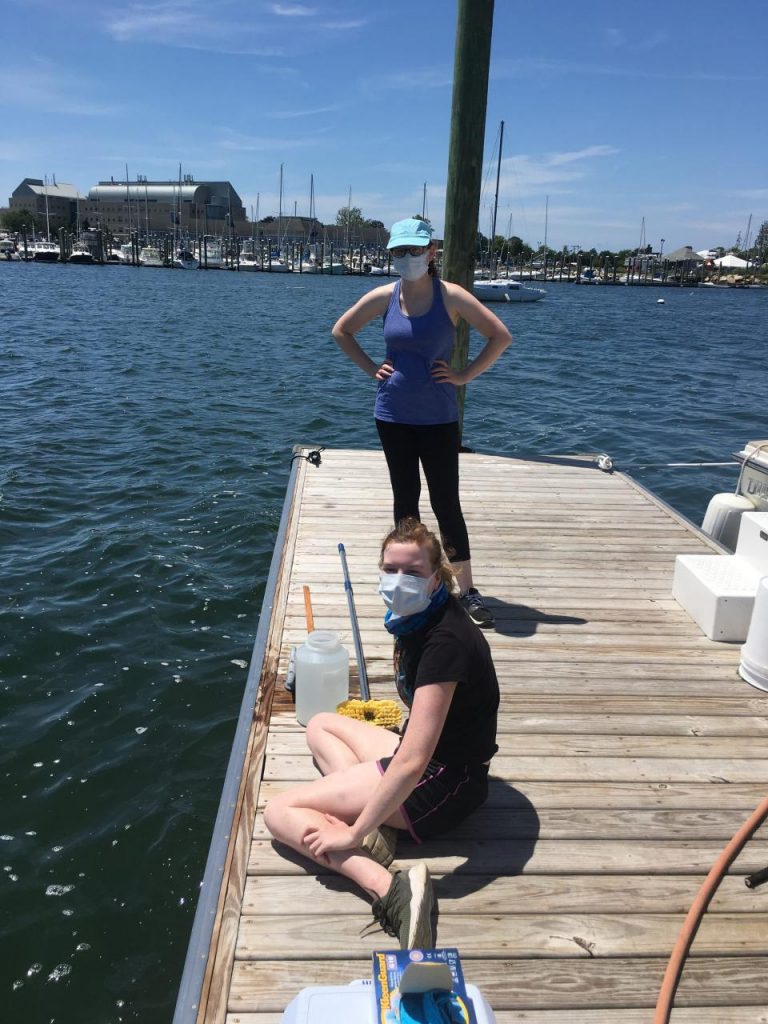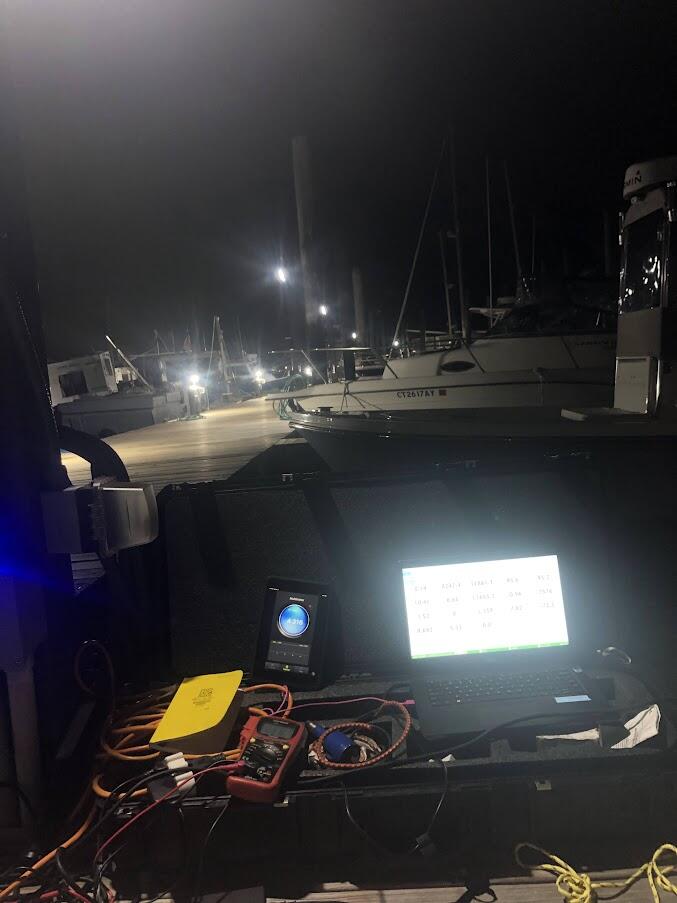Read more about how Pf. Tobias applies his experiences and expertise in coastal ecosystems and biogeochemistry to one of the East Coast’s critical habitats.
Marine Sciences Professor Craig Tobias Hired as NERR Director
Read more about how Pf. Tobias applies his experiences and expertise in coastal ecosystems and biogeochemistry to one of the East Coast’s critical habitats.
Marine Sciences Professor Craig Tobias Hired as NERR Director
Two research teams from DMS were featured in UConn Today’s latest edition.
The first was led by Penny Vlahos’s team and highlights polar research activities. You can read more about it here:
UConn Researchers Studying Multi-Year Arctic Sea Ice Before It Is Gone
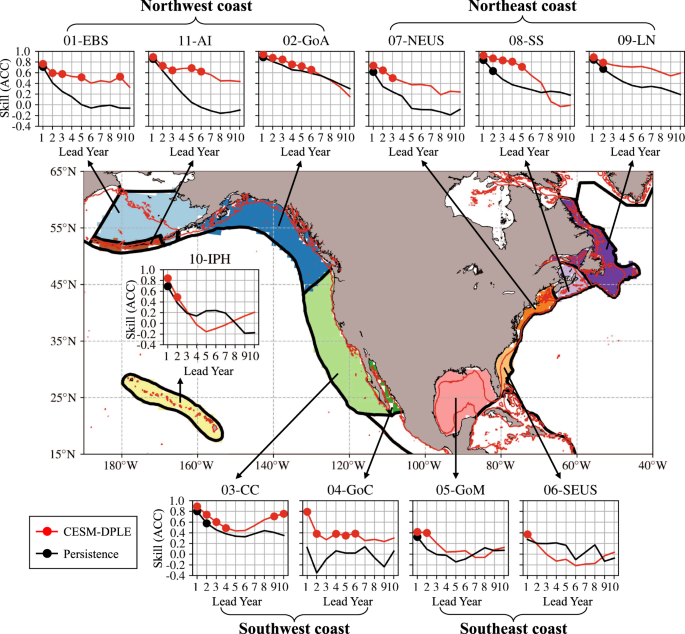
The other highlight focused on a new paper in Nature Communications led by Research Scientist Zhuomin Chen as part of Samantha Siedlecki’s group. That work identifies decadal predictive capacity in the ocean relevant to marine habitat shifts. Read more about it here:
Check out a summary of some of the achievements in our department in summer and fall 2023 below!
*identify students
Publications:
Professor Ann Bucklin and Paola Batta Lona
Population genetic analysis reveals distinct demographic histories of two Arctic euphausiid species and their responses to ecological drivers affecting communities in the Arctic Ocean.
Bucklin, A., Questel, J.M., Batta-Lona, P.G. et al. Population genetic diversity and structure of the euphausiids Thysanoessa inermis and T. raschii in the Arctic Ocean: inferences from COI barcodes. Mar. Biodivers. 53, 70 (2023). https://doi.org/10.1007/s12526-023-01371-y
Professor Hans Dam
This study led by alumni James deMayo, shows the limits to adaptation to the ongoing ocean warming and acidification. Animals adapted to these conditions are less fit than animals adapted to current conditions. Hence, there is no free lunch to adaptation to climate change.
deMayo James A.*, Brennan Reid S., Pespeni Melissa H., Finiguerra Michael, Norton Lydia, Park Gihong, Baumann Hannes and Dam Hans G. 2023Simultaneous warming and acidification limit population fitness and reveal phenotype costs for a marine copepod. Proc. R. Soc. B.2902023103320231033. https://doi.org/10.1098/rspb.2023.1033
Professor Heidi Dierssen:
NASA plans to launch three new missions for monitoring aquatic ecosystems from space: PACE in 2024, Geostationary Littoral Imaging Radiometer in 2026, and SBG in 2028. Each mission monitors unique space and time scales from inland water quality to coastal seagrass habitats to upwelling zones supporting rich phytoplankton blooms. Having many more wavebands than historic sensors, these missions will allow us for the first time to monitor phytoplankton diversity from space. Dr. Dierssen serves as the Science and Applications Team Leader for the PACE mission and is on the mission team for the SBG mission.
Dierssen et al. 2023. “Synergies Between NASA’s Hyperspectral Aquatic Missions PACE, GLIMR, and SBG: Opportunities for New Science and Applications”. Journal of Geophysical Research: Biogeosciences,
128, e2023JG007574. https://doi.org/10.1029/2023JG007574
Several spectral indices have been proposed in the last decade for remote detection of macroplastics in the environment, however no comprehensive analysis has been provided on the over land and water. Published and new algorithms proposed in this study were evaluated on hyperspectral remote sensing imagery taken over plastic targets in Ostend, Belgium. Dr. Dierssen developed and worked on this study as a Fulbright scholar to Belgium.
Castagna, Dierssen, et al. 2023. “Evaluation of historic and new detection algorithms for different types of plastics over land and water from hyperspectral data and imagery” Remote Sensing of the Environment. https://doi.org/10.1016/j.rse.2023.113834
Professor Senjie Lin:
In an opinion piece, Lin analyzed the complexity of how phosphorus-nutrient limitation interacts with ocean acidification in impacting phytoplankton, the foundation of the marine ecosystem. He further brought forth a suite of fundamental research questions that need to be addressed and proposed several multi-disciplinary multi-platform approaches that need to be deployed to address these questions.
Lin, S. Phosphate limitation and ocean acidification co-shape phytoplankton physiology and community structure. Nat Commun 14, 2699 (2023). https://doi.org/10.1038/s41467-023-38381-0
https://www.nature.com/articles/s41467-023-38381-0
Professor David Lund:
This paper indicates that weakening of the Atlantic overturning circulation regularly occurs when the Earth transitions from glacial to interglacial conditions (i.e. deglaciations). Graduate student Monica Garity’s results suggest weakening of the Atlantic circulation plays a key role in deglaciation, most likely through accumulation of heat in the subsurface North Atlantic and subsequent melting of ice shelves.
Multi-proxy evidence for Atlantic Meridional Overturning Circulation (AMOC) weakening during deglaciations of the past 150,000 years
Monica Garity and David Lund
Accepted in Paleoceanography and Paleoclimatology
Professors Rob Mason, Penny Vlahos, Michael Whitney, and Zofia Baumann:
The study, conducted while Maodian Liu was a visiting scientist at DMS, identified the importance of the river plume as a hot spot of methylmercury production in Long Island Sound. This finding is significant because methylmercury is toxic and bioaccumulative, and understanding its biogeochemical cycling is essential for public health management. The studies were conducted in conjunction with studies of carbon and nutrient dynamics in LIS (Vlahos and Whitney’s funded research).
“Riverine Discharge Fuels the Production of Methylmercury in a Large Temperate Estuary” Maodian Liu, Robert P. Mason, Penny Vlahos, Michael M. Whitney, Qianru Zhang, Joseph K. Warren, Xuejun Wang, Zofia Baumann. Environmental Science & Technology 2023 Vol. 57 Issue 35 Pages 13056-13066 DOI: 10.1021/acs.est.3c00473
Professors Rob Mason and Zofia Baumann:
This research highlighted the importance of the reduced sulfur content of organic matter in influencing the binding of methylmercury to dissolved organic matter and to influencing its bioaccumulation at the base of the aquatic food chain. The work was led by alumni Emily Seelen.
Seelen, E.A.*, Liem-Nguyen, V., Wünsch, U., Baumann, Z., Mason, R.P., Skyllberg, U., Björn, E. 2023.. Dissolved organic matter thiol concentrations determine methylmercury bioavailability across the terrestrial-marine aquatic continuum. Nat Commun 14, 6728. https://doi.org/10.1038/s41467-023-42463-4
Professor Rob Mason:
During cruises in 2021 in the Arctic, Marissa determined the relationship between nitrification in the water column and mercury methylation as this is an unexplored pathway for the production of methylmercury in ocean waters. Her studies showed that nitrification bacteria could be important for mercury methylation.
Despins, M.C., Mason, R.P., Aguilar-Islas, Lamborg, C.H., Hammerschmidt, C.R., Newell, S.E. 2023. Linked mercury methylation and nitrification across the oxic sub-polar regions. Frontiers in Environ. Chem., 4: DOI: 10.3389/fenvc.2023.1109537.
This chapter in the book highlighted the importance of sources and cycling of inorganic and organic contaminants in impacting human and wildlife health.
Chen, C.Y., Mason, R.P., Lohmann, R., Muir, D. 2023. Chemical pollution and the ocean. In: Oceans and Human Health: Opportunities and Impacts, 2nd Ed.,, Fleming, L.E. et al. (Eds.), Chapter 13, Elsevier, 351-426.
Mason, R.P., Buckman, K.L., Seelen, E.A., Taylor, V.T., Chen, C.Y. 2023. An examination of the factors influencing the bioaccumulation of methylmercury at the base of the estuarine food web. Sci. Tot, Environ. 866: Art. # 163996.
Professor Jim O’Donnell:
Knowing the height and period of waves at the shore of Connecticut during major storms is central to the cost-effective design of coastal flood protection systems. We have made measurements of waves for almost 20 years at two locations in Long Island Sound (WLIS and CLIS) in the deeper parts of the Sound, so we need a model to create estimates at the coast. This paper, led by alumni Amin Illia, describes our implementation of FVCOM and SWAVE to do that, and it reports how well it works and what we need to do to improve it.
Ilia, Amin*, Alejandro Cifuentes-Lorenzen, Grant McCardell, and James O’Donnell. 2023. “Wind Wave Growth and Dissipation in a Narrow, Fetch-Limited Estuary: Long Island Sound” Journal of Marine Science and Engineering 11, no. 8: 1579. https://doi.org/10.3390/jmse11081579
https://www.mdpi.com/2077-1312/11/8/1579
Professor Samantha Siedlecki:
Over the past 10 years, Siedlecki and her team have developed a seasonal ocean prediction system, JISAO’s Seasonal Coastal Ocean Prediction of the Ecosystem (J-SCOPE), for the coastal waters of the Pacific Northwest. The results of this work include publicly available seasonal forecasts of ocean acidification variables, hypoxia, temperature, and ecological indicators that are tailored for decision-makers involved in federal, international, state, and tribal fisheries that have been used to inform decisions. This work provides a retrospective look at the first 10 years of forecasting.
Siedlecki, S.A., S.R. Alin, E.L. Norton, N.A. Bond, A.J. Hermann, R.A. Feely, and J.A. Newton. Can seasonal forecasts of ocean conditions aid fishery managers?: Experiences from 10 years of J SCOPE. Oceanography. 2023. https://tos.org/oceanography/assets/docs/36-2-3-siedlecki.pdf
Professor Pieter Visscher:
The Bernhard paper investigated the role of biology in Earth’s oldest fossils (2.3 to 3.5 billion year old), using modern analogs. The Bernhard et al. paper discovered new species of protists that shape the internal fabric microbial rocks. This work the was co-authored by one DMS undergraduate (Luke Fisher), two DMS MS students (Quinne Murphy, Heidi Yeh) and two other DMS faculty (Paola Batta Lona and Ann Bucklin)
Bernhard, J.M., L.A. Fisher, Q. Murphy*, L. Sen, H. Yeh*, A.S. Louyakis, F. Gomaa, M. Reilly, P.G. Batta Lona, A. Bucklin, V. Le Roux, P.T. Visscher 2023. Transition from stromatolite to thrombolite fabric: Potential role for reticulopodial protists in lake microbialites of a Proterozoic ecosystem analog. Frontiers in Microbiology 30, doi: 10.3389/fmicb.2023.1210781
The paper first authored by Marlisa Marthino de Brito is about understanding whiting events (production of small carbonate minerals) in lakes. Often, these CO2-consuming mass events are predicted based on the chemical composition of the water column (the alkalinity) but are not observed because the picoplankton “slime” scavenges the calcium from the water and inhibits the mineral production. This slime is later degraded by microbes at the sediment surface and minerals are formed there . This has implications for satellite estimations of carbon sequestration in lakes. Marlisa defended her PhD on September 27, at the Université de Bourgogne Franche-Comté in Dijon, France. Pf. Visscher was her major advisor.
Martinho de Brito, M., I. Bundeleva, F. Marin, E. Vennin, A. Wilmotte, L. Plasseraud, P.T. Visscher. 2023. Properties of exopolymeric substances (EPSs) produced during cyanobacterial growth: Potential role in whiting events. Biogeosciences 20:3165–3183, doi.org/10.5194/bg-20-3165-2023.
Professor Penny Vlahos:
For the first time, the contribution of sedimentary fluxes to carbon and nutrient cycling in the shallow Pacific Arctic region was empirically quantified; carbon and nutrient effluxes from sediments were shown to be greatest in ice-free waters with high rates of surface productivity.
Barrett, L. J.*, Vlahos, P., Hammond, D. E., & Mason, R. P. (2023). Sediment-water fluxes of inorganic carbon and nutrients in the Pacific Arctic during the sea ice melt season. Continental Shelf Research, 105116. https://doi.org/10.1016/j.csr.2023.105116
Professor Evan Ward:
Blue mussels were exposed to nylon microfibers, a particle control, or non-particle control for 21 days, but these exposures did not show any effects on the mussel gut microbiome or gut tissues. Please find here: https://ami-journals.onlinelibrary.wiley.com/doi/full/10.1111/1462-2920.16496
Collins, H.I.*, Griffin, T.W.*, Holohan, B.A., & Ward, J.E. (2023) Nylon microfibers develop a distinct plastisphere but have no apparent effects on the gut microbiome or gut tissue status in the blue mussel, Mytilus edulis. Environmental Microbiology, 1-15. Available from: https://doi.org/10.1111/1462-2920.16496.
Voiding feces (depuration) is an important factor that determines the community structure of gut microbiomes from blue mussels.
Griffin, T.W.*, Darsan, M.A., Collins, H.I.*, Holohan, B.A., Pierce, M.L., & Ward, J.E. (2023). A multi-study analysis of gut microbiome data from the blue mussel (Mytilus edulis) emphasises the impact of depuration on biological interpretation. Environmental Microbiology, 1-15. https://doi.org/10.1111/1462-2920.16537
Professor Ward and Sandra Shumway
A critical assessment of microplastics in molluscan shellfish with recommendations for experimental protocols, animal husbandry, publication, and future research
Sandra E. Shumway, Kayla Mladinich*, Noreen Blaschik, Bridget Holohan and J. Evan Ward. Reviews in Fisheries Science and Aquaculture 2023. https://doi.org/10.1080/23308249.2023.2216301 Open Access until March 1, 2024 https://www.tandfonline.com/doi/full/10.1080/23308249.2023.2216301
Grants:
Professor Heidi Dierssen:
Dr. Dierssen was awarded a new NASA Interdisciplinary Science grant $1.7M to study phytoplankton, carbon, and sea ice dynamics in the Western Antarctic Peninsula region of the Southern Ocean with colleagues from Rutgers University, University of Colorado, and Woods Hole Oceanographic Institution.
Professor Rob Mason:
NSF Chemical Oceanography. 9/1/2023-8/31/2026. Mason, sole PI. Constraining the air-sea exchange of inorganic and methylated mercury with high resolution spatial and temporal measurements in the Sargasso Sea. $680,675.
Professor Leonel Romero
The Air-Sea Interaction Laboratory received a $712,215 grant from NSF to conduct novel measurements of breaking waves in the open ocean using stereo imagery from visible and infrared cameras. The results of this study will contribute greatly to our understanding of wave breaking with important implications for air-sea exchanges, remote sensing, and the prediction of microseisms.
Professor Samantha Siedlecki:
A new award to study coastal terrestrial liming as a potential method of mCDR via ocean alkalinity enhancement with a holistic program to monitor the carbon chemistry of a small coastal lagoon before and after the application of calcitic limestone on the surface of an abutting golf course. This work is a part of a larger investment that the NOAA Ocean Acidification Program on behalf of the National Oceanographic Partnership Program (NOPP) announces $24.3M of funding to advance research in marine carbon dioxide removal. https://oceanacidification.noaa.gov/fy23-nopp-mcdr-awards/
NOPP (2023-2026) mCDR 2023: An opportunity to study Ocean Alkalinity Enhancement, CDR, and ecosystem impacts through coastal liming (PI: Palter, URI) Total $1,538,451.52 ($300,540 to UConn)
Awards:
Congratulations to graduate student Mengyang Zhou was awarded the CERF (Coastal and Estuarine Research Foundation) Rising TIDES (Toward an Inclusive, Diverse, and Enriched Society) Scholar 2023. This award provides valuable support for attending conferences and fostering career development in the field of coastal and estuarine science and management.
Congratulations to Mengyang Zhou on receiving the best poster award at the recent Gordon Research Conference on Coastal Ocean Dynamics in June of 2023. His poster entitled “Constraints on the bottom water residence time in an economically-important embayment of the Southern Benguela Upwelling System” is work that is part of an NSF-funded project led by Pf. Julie Granger and Pf. Samantha Siedlecki in partnership with colleagues at the University of Capetown. Mengyang ran a series of particle tracking experiments in a high-resolution simulation to quantify the residence time of bottom waters plagued with hypoxia. Interannually, years with short bottom water residence time experienced little hypoxia. This work is part of his Ph.D. dissertation research with Pf. Julie Granger.
Our PhD student Anagha Payyambally was featured in UConn Today to celebrate her achievement of receiving the Quad Fellowship. Anagha is one of only 100 recipients out of over 3000 applicants to receive this fellowship to her graduate studies. This new fellowship program supports exceptional students who are citizens of the United States, Australia, India, and Japan to support their graduate studies in the United States and build collaboration among scientists and technologists. Read the story here with quotes from Anagha and her advisor Dr. Manning.
Congratulations to Brendon Goulette, an undergraduate student in our department who was awarded a Connecticut Sea Grant Undergraduate Research Fellowship for the work he is doing with Professors Catherine Matassa and Samantha Siedlecki and PhD student Halle Berger. Brendon is researching how climate change is affecting sea scallops, a significant commercial fishery in New England.
Read more about Brendon’s research here!
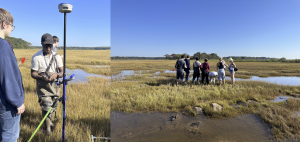
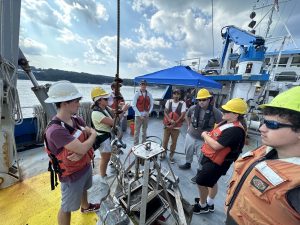
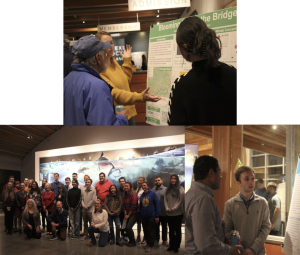
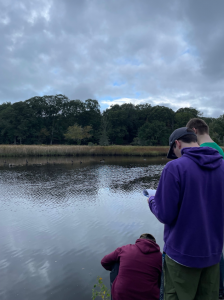
By Mengyang Zhou
Undergraduate classes within the Department of Marine Sciences (DMS) are bridging the classroom learning, fieldwork and addressing environmental challenges that are relevant to the local community.
As undergraduate students enter their junior and senior year, they engage in experiential learning through classes such as MARN 3001 (Foundations of Marine Sciences, instructed by Pf. Leonel Romero, Pf. Jason Krumholz, and Dr. Claudia Koerting, historically also co-taught by Pf. Craig Tobias who is on sabbatical this year), MARN 4001 (Measurement and Analysis in Coastal Ecosystems, instructed by Pf. Julie Granger and Dr. Claudia Koerting) and MARN 3030 (Coastal Pollution and Bioremediation, instructed by Pf. Pieter Visscher). These classes are designed to provide hands-on experience of fieldwork, lab experiments and data analysis, and empower students to apply classroom knowledge to the real world, making a positive impact on environmental problems in the local community.
The class Foundations of Marine Sciences (MARN 3001) focuses on carrying out and interpreting the most fundamental oceanographic measurements in coastal habitats such as beaches, marshes and estuaries. In the fall semester of 2023, students went on field trips to Long Island Sound and the Thames River aboard the RV Connecticut and RV Lowell Weicker. They collected hydrographic data using CTDs (Conductivity, Temperature and Depth), water samples for nutrient measurements, as well as sediment samples. They also conducted marsh elevation mapping in Bluff Point Beach and Barn Island. Upon analyzing these data and publicly available datasets provided by NOAA (National Oceanic and Atmospheric Administration), students learned how to characterize the changing coastal systems and how organisms adapt to those changes.
Students in the class Measurement and Analysis in Coastal Ecosystems (MARN 4001) assessed the potential causes of water quality impairment in Wequetequock Cove near Stonington, CT and Pawcatuck River, and built connections with the local community. Beyond learning textbook knowledge, they went into the field to collect water and sediment samples that were analyzed in the lab for nutrient and chlorophyll concentrations and O2 consumption rates. They also learned how to analyze, interpret and archive the data they collected, as well as those collected by CUSH (Clean Up Sounds and Harbor), a local non-profit organization who has been conducting a long-term survey of the cove’s water quality. Finally, they tried to address important questions, such as identifying the sources of nutrient overload in the cove, and understanding the causes of summertime O2 depletion in the cover, and constructed scientific posters and presented their scientific findings to a broad audience in Mystic Seaport Museum.
The class Coastal Pollution and Bioremediation (MARN 3030) is another example of a class that is designed to connect students with the real world through service-learning. This class focuses on how pollution in the nearshore marine environment impacts the marine food web. In the fall semester of 2023, students learned the fundamental environmental monitoring techniques and data analysis which were applied to coastal pollution research. They monitored the overall health of the Mystic River through field and lab experiments that included water column profiling, sediment quality and enterococcal counts before and after rain events. Their work provided data for the Alliance of the Mystic River Watershed, a local citizen group that focuses on resilience and social justice along the Mystic River. Upon discussion about local policy related to coordinated resilience planning and watershed protection, they also presented their findings to the public in Mystic Seaport Museum, together with MARN 4001.
To reflect on experiential learning classes, Shannon Jordan, who took MARN 4001 and now a master student in the DMS, said: “MARN 4001, more than any other core class, was an introduction to oceanographic research as it actually occurs. Experimental design, methods of data management and interpretation are not outlined in a manual. In contrast to many undergraduate science labs, this course encourages students to take the reins in each aspect of the scientific method. MARN 4001 was an excellent environment in which to explore individual research interests and the process by which questions are translated into hypotheses, experiments, results, and further questions. The opportunity to develop these practical skills in a collaborative environment – with ready access to the vast knowledge base of experienced faculty – was incredibly valuable.”
Through these experiential learning classes, students worked on interdisciplinary problems and gained plenty of hands-on experience in the field of oceanography. They also proposed solutions to address the local environmental problems, and presented them to a broad audience. The valuable skill sets they developed in the past semester will prepare them for their future career and academic pursuits.
DMS Ph.D. Candidates Kayla Mladinich-Poole and Lauren Barrett have been selected as finalists in the 2024 cohort of the NOAA John A. Knauss Marine Policy Fellowship. Kayla will join the executive branch and Lauren will join the legislative branch. https://seagrant.noaa.gov/2024-knauss-finalists-announcement/
Congratulations to Professor Samantha Siedlecki who was recently awarded tenure and promotion to Associate Professor from the University of Connecticut! We are so proud to have Prof. Siedlecki as a member of our department and to see her awarded tenure.
Professor Siedlecki has been a highly valued member of our department since her arrival at UConn in 2017 and has played many leadership roles in our department and the broader scientific community. Dr. Siedlecki’s research group focuses on coastal biogeochemistry using a combination of simulations and observations to characterize historical and ongoing change and forecast future trends. A particular focus of her group’s work is on coastal carbon and oxygen cycling, including the impacts of decreasing ocean pH (ocean acidification) and decreasing oxygen (deoxygenation) resulting from climate change and other human impacts.
Her research accomplishments have been recognized through an Early Career Faculty Innovators Program Fellowship from NCAR and a Kavli Fellowship from the US National Academy of Sciences. Since her arrival at UConn, she has received approximately 16 grants totalling over $4 million in funding from organizations including NOAA and NSF, including serving as co-lead PI on a $1 million grant on assessing the vulnerability of sea scallops to ongoing ocean change.
Her teaching contributions have included developing two new courses, Ocean Expedition (a very popular course for our graduate students) and Biogeochemical Modeling, and teaching Environmental Reaction and Transport, a course that allows undergraduate students to develop their quantitative and problem solving skills. She has mentored numerous personnel in the department, and currently supervises two PhD students, one masters student, one research associate, one research scientist, and multiple undergraduate students.
Dr. Siedlecki has been highly active in departmental service, having served on several departmental committees, including the Advisory Committee to the Head, and was a founding member of the department’s Justice, Equity, Diversity and Inclusion committee. She was recognized with a Climate, Diversity, Equity and Inclusion Award from the UConn College of Liberal Arts and Sciences in 2022 due to her contributions to fostering an inclusive climate in our department and at UConn.
Outside of UConn, she has had substantial contributions to research organizations and activities at the regional, national and international level, including serving as co-coordinator for the Northeast Coastal Acidification Network (NECAN) and serving as a member of the international scientific committee for the 5th International Symposium on Oceans in a High CO2 World, and also gave an invited plenary presentation at this conference. Dr. Siedlecki makes stakeholder engagement and outreach critical components of her research program and has participated in numerous outreach activities with members of the aquaculture industry and management organizations along with members of her research group.
Dr. Siedlecki has co-authored approximately 36 publications and some of her recent publications are listed below.
Now that she has been awarded tenure, Prof. Siedlecki looks forward to finalizing her group’s work with east coast coastal communities through a regional vulnerability assessment of scallops and the communities who rely on them. She plans to conduct similar assessments in other regions with the international research community and is currently preparing a proposal with South African colleagues.
Congratulations to Dr. Siedlecki! We are excited to watch the future accomplishments by you and your team!
Recent publications:
“Seasonality and life history complexity determine vulnerability of Dungeness crab to multiple climate stressors” by Berger et al. (2021) in AGU Advances. This paper was led by Siedlecki lab graduate student Halle Berger.
“Coastal processes modify projections of some climate-driven stressors in the California Current System” by Siedlecki et al. (2021) in Biogeosciences.
“Projecting ocean acidification impacts for the Gulf of Maine to 2050: New tools and expectations” by Siedlecki et al. (2021) in Elementa: Science of the Anthropocene.
Prof. Siedlecki at the Avery Point campus
Prof. Siedlecki and PhD student Halle Berger in Norway following a research conference.
Prof. Siedlecki on the R/V Connecticut during the Oceanographic Expedition graduate course in 2022
Congratulations to Dr. Patricia Myer, the department’s newest PhD! Here is a description and some photos of Dr. Myer’s PhD journey, in her own words.
My Ph.D. dissertation defense was on March 20th, 2023, and titled “A Critical Examination of the Factors Controlling Methylmercury Uptake into Marine Plankton.”
I am a student in Dr. Robert Mason’s group and my research includes a three-year long time series of methylmercury in phytoplankton in Narragansett Bay, RI, a research cruise in the Northwest Pacific (NOAA GU1905), and laboratory uptake experiments with the dinoflagellate O. marina.
The goal of these projects was ultimately to compare the effects of biological and environmental variables (e.g., cell size, temperature, dissolved organic matter) between laboratory experiments and environmental studies to try to disentangle the leading drivers of methylmercury accumulation into plankton. The main takeaway is that relationships seen in laboratory experiments, both from my work and the literature, are not nearly as straightforward in the environment. There is a lot more work to be done to understand these complex relationships.
Currently, I have one publication from my prior undergraduate work (https://doi.org/10.1007/s10646-022-02548-0) and one from my work in the Mason lab that is not part of my dissertation (https://doi.org/10.1016/j.chemosphere.2022.134609). I am currently preparing three papers relating to my dissertation for publication.
This work was funded by NSF Chemical Oceanography and the UConn Predoctoral Award.
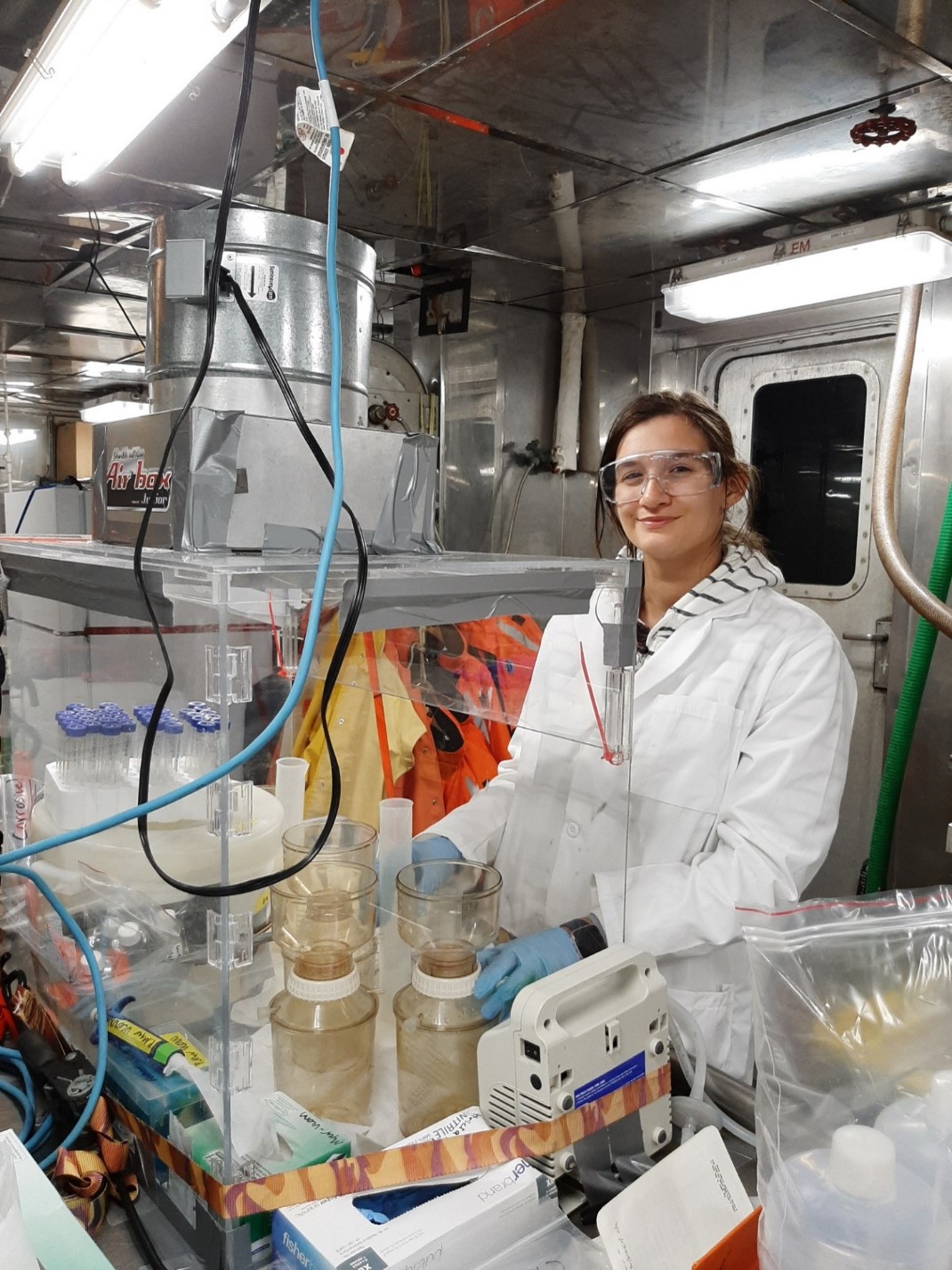
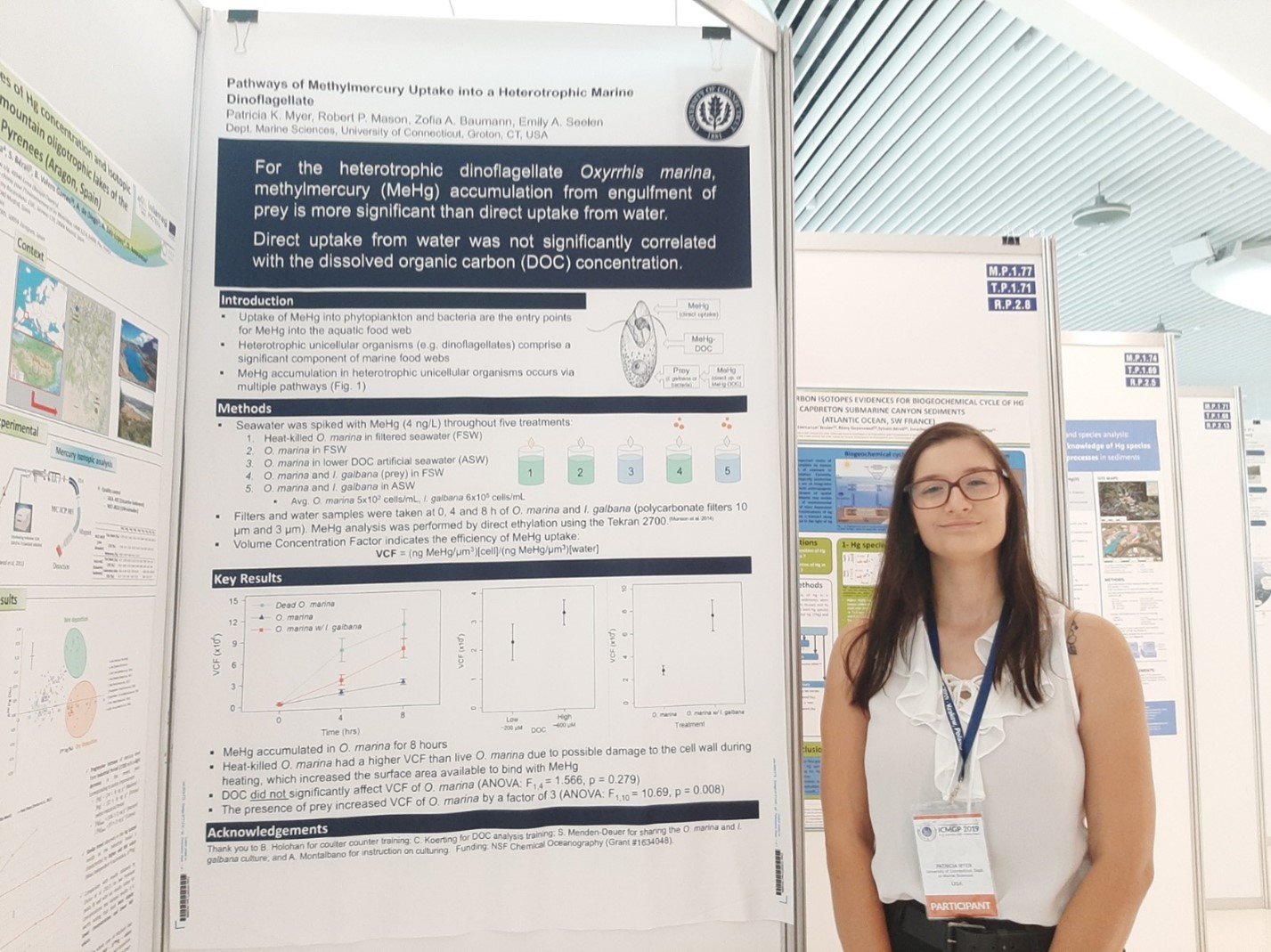
Congratulations to Anagha Payyambally, a PhD student in Professor Cara Manning’s research group, who has been selected as part of the inaugural class of Quad Fellows. Anagha is one of 100 recipients out of over 3200 applicants across all STEM fields to be selected for this fellowship, which is administered by Schmidt Futures (a philanthropic initiative of Eric and Wendy Schmidt). The rigorous selection process involved a written application, reference letters, and two interviews, and was designed to assess candidates’ academic excellence, intellectual rigor, interest in the intersection of STEM and society, capacity to bridge differences, and orientation towards results.Here is some info on the award, from Quad:
“This program sponsors 100 exceptional American, Japanese, Australian, and Indian master’s and doctoral students in science, technology, engineering, and mathematics (STEM) to study in the United States. The fellowship develops a network of science and technology experts committed to advancing innovation and collaboration in the private, public, and academic sectors, in their own nations and among Quad countries. The program builds foundational understanding among Quad Fellows of one another’s societies and cultures through cohort-wide trips and robust programming with each country’s top scientists, technologists, and politicians.”
The next application for Quad Fellows is expected to open in November 2023.
Congratulations to Mary McGuinness who presented her MSc thesis research on alkalinity in Long Island Sound embayments on November 17, 2022. Mary was advised by Dr. Penny Vlahos. Below is a description written by Mary about her research at UConn and her accomplishments during her degree. Check out the photos of her field work, too! Congratulations, Mary, and best wishes for the future!
I came to UConn in June 2020 after receiving the Crandall Fellowship for my commitment to diversity enhancement in higher education and science during my time as a undergraduate of the New Jersey Institute of Technology. While working on the Alkalinity of Long Island Sound Embayments (ALISE) project I was able to conduct field work across the Long Island Sound and help close the gap for alkalinity and inorganic carbon data in these rivers. Over a two year study I observed spatial trends for alkalinity across the Long Island Sound rivers, at their freshwater endmembers and detected help levels of acidification sensitivity. Lastly I produced an attributive model that indicated importance differences between the eastern and western Long Island Sound and presented novel controlling parameters which can be tested with the collection of further data to help fully resolve this system.
I was able to present my work virtually the Ocean Sciences Meeting (2022) and in person at the Long Island Sound Conference (2022) and Society of Environmental Toxicology and Chemistry Conference (SETAC) (2022). At the SETAC Conference I was presented with the best Oral Presentation Award.
